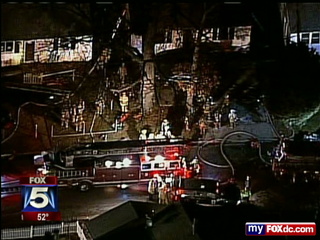Deputy chief’s memo blasts training at DC Fire & EMS Department
Click here if video above fails to play
Looking for a quality used fire truck? Selling one? Visit our sponsor Command Fire Apparatus
Read executive summary of memo
WRC-TV/NBC4 reporter Mark Segraves has the story of a retiring deputy fire chief who left behind a brutal memo about the training of DC Fire & EMS Department firefighters. In the memo, the deputy chief says the entire training division is opposed to an 8 to 10 week recruit school, cut down from 18-20 weeks. The memo claims this has put rookies into fire stations who’ve never opened a hydrant valve or have the knowledge to lay-out and provide a water supply for an engine company:
the Recruit Firefighter Training Curriculum to the mandated length on file with IFSAC. We have written numerous management alerts on this topic. We have been ordered to reduce the 20 week-long entry-level firefighter curriculum to a functional 8-10 weeks in length. The entire Training Division is united in opposing this practice, which we regard as legally and technically insufficient. This radical change was made with no research, analysis or written evidence to support it, and it is simply insufficient to safely train entry-level personnel in basic competencies, particularly psychomotor competencies. This practice is an accident waiting to happen. Further, it jeopardizes our accreditation as an IFSAC accredited training institution. I will continue to argue against this dangerous policy. In addition, we are forced to cut out material that we think is important but that is not absolutely mandatory for FF certification–such as hands-on training on Metro cars at Landover, as well as physical conditioning. Our entry-level personnel are not coming to us with previous experience. They are true newcomers to the fire service. It is critically important that they receive standardized entry-level training during recruit school, with physical practice to develop psychomotor proficiencies. The recruits that graduated from the shortened academies in CY2015-16 (before we ceased the practice when I began as Training Director in Sept. 2016) reported to Operations having never operated a hydrant valve and were unable to lay-out and establish a water supply for an engine company. That is as basic as entry-level skills get. Eight-week academies are for organizations that only certify to the Firefighter I level, and that then do not treat the probationer as minimum staffing, but rather use probationer as extra staffing while continuing their entry-level training at the station assignment. That is completely contrary to our business processes. We certify our graduates as FF I & II and Haz mat Ops, as well as trained to operate in Metro, etc. Our graduates must be ready to assume duty as minimum staffing on Day One in Operations with no special handling. Please restore the curriculum to a safe length before a graduate of our academy injures themselves or others.
Reporter Segraves talked with IAFF Local 26 president Dabney Hudson and received a statement from DC Fire & EMS Department Chief Gregory Dean.
Mark Segraves & Sophia Barnes, WRC-TV/NBC4:
“I think it’s unconscionable,” Dabney Hudson, president of the D.C. Firefighters Union Local 36, said in response to the memo. “When you shortchange the training, you shortchange everybody.”
Hudson’s own training program was nearly twice as long, and he says it was a lot of information to grasp in 18 weeks.
“To think they would cut that to 8 to 10 weeks… I couldn’t imagine,” he said.
D.C. Fire chief Gregory Dean says that firefighter training is adequate.
“Training has been and remains my top priority since joining the Department and we have significantly expanded the frequency and level of training,” Dean said.
“Things aren’t as great as they look. We have significant problems,” Hudson said.
The memo and union representatives suggest the training program left at least some recruits unprepared to fight fires.
Hudson said some recruits are sent out before they had mastered basic skills like turning on portable radios.
“We’ve had issues with new recruits in the field not being able to perform basic tasks,” Hudson said. “Really rudimentary and basic tasks that can’t be performed.
News of these complaints may not be new to managers, as the memo was meant to reinforce warnings given to management over the past several years.
“Some of these issues we are already working on; I will be looking into other issues,” Dean said.
Also notable in the memo is the claim that DC Fire & EMS is hiring recruits who “lack basic academic skills” to complete rookie school:
Add a secondary layer of screening between the civil service entrance exam and the start of entry-level recruit training. Our recruits are not entering the Training Academy ready to learn. Many lack basic academic skills that are required to successfully complete our entry-level curriculums. In addition, many of them do not appear to have been properly screened for readiness to enter a paramilitary organization, and are exhibiting symptoms of mental illness and severe emotional disturbances which are disruptive to the learning environment. We strongly recommend that the Department review the policies and procedures at the Police and Fire Clinic and the Suitability Board to ensure that the highest standards are being used. We also recommend that a consultant review the entry-level hiring process and ensure that it is structured to assess psychological readiness and mental health in addition to academic readiness. We recommend that all applicants must successfully complete the HOBET or a similar test before being allowed to begin recruit or cadet training. The HOBET (Health Occupations Basic Entrance Test) is an entrance exam used in the United States to determine if a person is qualified to enter a program to become a health occupation worker. Similar tests include the Test of Essential Academic Skills (TEAS) and the Discover Health Occupations Readiness Test.






